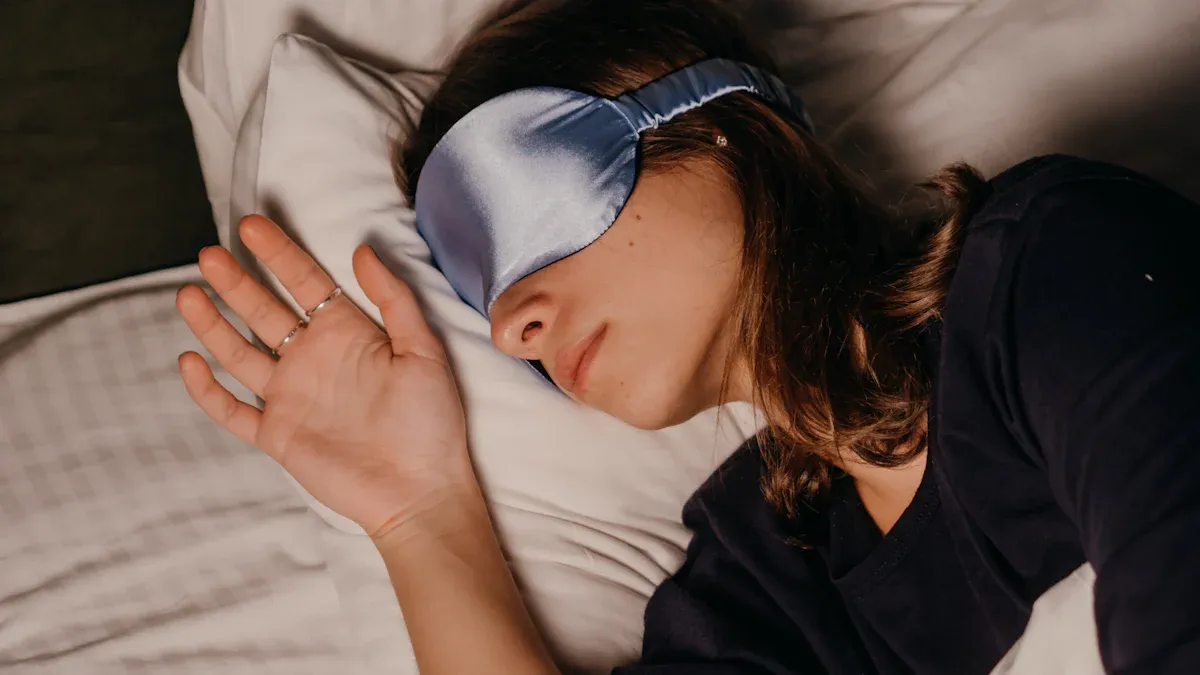
Oversleeping might seem okay, but it can harm your health. Studies show that sleeping too much is linked to memory problems, sadness, and body inflammation. Sleeping longer also raises the risk of obesity, diabetes, and heart issues. People who sleep over eight hours daily have a 46% higher chance of having a stroke. Mental health studies indicate that sleeping too little or too much can cause stress. This highlights how important it is to balance your sleep.
If you’ve asked, “Is it bad to sleep too much?”, the answer is yes. Oversleeping can hurt your health and make you feel tired. It can also lower your energy and make you less productive. Using tools like a sleep tracker ring can help you monitor your sleep habits. By sleeping the right amount, you stay healthy, active, and focused during the day.
Key Takeaways
-
Sleeping too much can hurt your health, causing problems like weight gain, diabetes, and heart issues.
-
Try to sleep 7-9 hours each night to stay healthy and think clearly.
-
Notice signs of oversleeping, like feeling tired even after sleeping a lot, to fix possible health problems.
-
Keep a steady sleep routine to avoid oversleeping and feel better overall.
-
If you keep oversleeping, talk to a doctor to check for hidden health issues.
How Much Sleep Is Too Much?
Recommended Sleep Duration
How much sleep you need depends on your age and habits. Experts suggest adults sleep 7-9 hours each night. Teenagers should aim for 8-10 hours, while kids need even more. These numbers are based on research to keep you healthy.
Sleeping more than 7 hours often can cause problems. Studies show your brain works best with 5-7.5 hours of sleep. Sleeping over 8 hours may hurt focus and memory.
|
Age Group |
Recommended Sleep Duration |
|---|---|
|
Adults (18-64) |
7-9 hours |
|
Teenagers (14-17) |
8-10 hours |
|
Children (6-13) |
9-11 hours |
Defining Oversleeping
Oversleeping means sleeping more than your body needs. Experts say sleeping over nine hours a night is too much. It might seem fine, but oversleeping can harm your health. Research shows it can lower brain function, especially in people with depression. It may also cause tiredness, headaches, and raise the risk of diseases.
Signs of Oversleeping
Knowing the signs of oversleeping helps you fix the problem. Feeling tired or sluggish after sleeping a lot is common. You might also get headaches, struggle to focus, or feel low energy. If you sleep too much but still feel bad, there may be a deeper issue.
Watch how long you sleep and how you feel daily. Tools like the Aura Ring can track your sleep and show if you oversleep. Learning these signs lets you improve your sleep and stay healthy.
Health Risks of Sleeping Too Much
Physical Health Problems
Sleeping too much can cause serious health issues. Studies show that being overly sleepy during the day raises the risk of heart-related deaths by over two times. This problem affects 5–30% of people and is tied to obesity, high blood pressure, and diabetes. Older people face even bigger risks.
Sleeping long hours is also linked to lasting illnesses. Research shows both very short and very long sleep can lead to more diseases. Sleeping over nine hours often can harm your body. It may cause swelling and weaken your immune system.
|
Study Topic |
Key Findings |
|---|---|
|
Sleep Duration |
Short (≤6h) and long (≥9h) sleep raise chronic disease risks. |
|
Data Accuracy |
Self-reported sleep may not always match actual sleep patterns. |
Mental Health Effects
Too much sleep doesn’t just hurt your body—it affects your mind too. Studies show oversleeping can make mental health worse, especially for people with depression. Research found that sleeping too little or too much can lower daily happiness. Depressed people feel this even more, with oversleeping adding to sadness and tiredness.
|
Study Name |
Key Findings |
Group Studied |
Mental Health Impact |
|---|---|---|---|
|
Sleep Duration and Emotional Well-being in Depressed Adults |
Both short and long sleep linked to worse daily emotions. |
Depressed adults |
Oversleeping worsens mood and daily feelings. |
If you feel tired or sluggish even after sleeping a lot, it might mean there’s a deeper mental health issue. Fixing these problems early can help prevent worse outcomes.
Lifestyle Challenges
Sleeping too much can mess up your daily life. You might find it hard to stay productive or stick to a routine. Oversleeping often leaves you feeling groggy, making it tough to focus on tasks. This can lead to missed chances and lower efficiency.
Being overly sleepy during the day can also hurt your social life. You might skip events or cancel plans because you’re too tired. Over time, this can damage relationships and lower your happiness.
Using tools like the Aura Ring can help track your sleep and find ways to improve. By learning about the risks of oversleeping, you can take steps to stay healthy and avoid these problems.
Link Between Oversleeping and Poor Health
Chronic Diseases and Mortality Risk
Sleeping too much can lead to serious health problems. Regularly sleeping over nine hours raises the risk of obesity, diabetes, and high blood pressure. Studies show women who sleep 9–11 hours are 38% more likely to get heart disease.
Sleeping too long also increases the chance of dying early. Research shows both short (<5 hours) and long (>9 hours) sleep can raise death risks. People sleeping over nine hours have a 1.74 times higher chance of dying early.
🛑 Note: Sleeping longer doesn’t mean better rest. It may point to health problems like depression or sleep disorders.
Impact on Immune System and Weight
Oversleeping affects your body in many ways. People sleeping 9–10 hours are 25% more likely to gain weight than those sleeping 7–8 hours. Oversleeping also raises the risk of obesity by 21%.
|
Evidence Type |
Findings |
|---|---|
|
Weight Gain Risk |
Long sleepers were 25% more likely to gain 5 kg. |
|
Obesity Risk |
Oversleeping raises obesity risk by 21%. |
|
Heart Disease Risk |
Women sleeping 9–11 hours are 38% more likely to get heart disease. |
Sleeping too much may mean poor sleep quality or body inflammation. Sleep problems like sleep apnea can make you oversleep, weaken your immune system, and cause illnesses.
Sleep Quality vs. Sleep Quantity
Good sleep quality is more important than sleeping longer. A study found college students who slept seven hours felt better when their sleep quality was good. Poor sleep quality often leads to oversleeping, which harms your health.
Focus on improving how well you sleep, not just how long. Tools like the Aura Ring can track your sleep and help you improve. Better sleep quality lowers the risks of oversleeping and keeps you healthier.
Why Do People Oversleep?

Oversleeping happens for many reasons. Knowing these causes can help you fix the problem and stay healthy.
Medical Conditions
Some health problems can make you sleep too much. Diseases like diabetes, hypothyroidism, and brain disorders such as Alzheimer’s or Parkinson’s can change how you sleep. These issues often make you feel very tired, so you sleep longer. Feeling very sad, like with depression, is another reason. It can drain your energy and make you sleep more to escape feelings.
Medicines for these illnesses can also make you oversleep. Drugs like sedatives, antidepressants, and allergy pills can cause longer sleep. Pain that doesn’t go away can also disturb your sleep at night. This might make you sleep more during the day to catch up.
|
Medical Condition |
Description |
|---|---|
|
Hypothyroidism |
Makes you feel tired and sleep longer. |
|
Neurological disorders |
|
|
Major depressive disorder |
Causes emotional tiredness and oversleeping. |
|
Chronic pain |
Breaks sleep at night, leading to daytime sleepiness. |
Lifestyle and Behavioral Factors
Your daily habits can affect how much you sleep. Bad sleep habits, like going to bed at different times or using phones before sleeping, can mess up your sleep schedule. This can make you oversleep as your body tries to recover.
Stress and feeling overwhelmed can also make you sleep more. When life feels hard, your body may need extra rest. Drinking alcohol or caffeine close to bedtime can also hurt your sleep quality, making you oversleep the next day.
Tip: Go to bed at the same time every night. Avoid caffeine and alcohol before sleeping to improve your sleep.
Sleep Disorders
Sleep problems are a big reason for oversleeping. Hypersomnia makes people very sleepy during the day, so they sleep longer. Narcolepsy causes sudden sleep attacks, which can mess up your sleep routine.
Another common problem is obstructive sleep apnea. It stops your breathing while you sleep, giving you poor sleep and making you very tired. These problems not only affect how long you sleep but also your overall health.
|
Disorder Type |
Prevalence (%) |
|---|---|
|
Hypersomnia |
5 |
|
Obstructive sleep apnea |
2.9 |
If you think you have a sleep problem, talk to a doctor. They can help find out what’s wrong and give you the right treatment.
How to Avoid Oversleeping
Set a Sleep Schedule
Having a regular sleep schedule helps stop oversleeping. Your body works best with a steady routine. Going to bed and waking up at the same times daily keeps your internal clock balanced. Irregular sleep patterns can confuse your body and harm your health.
Here are some tips to create a good sleep schedule:
-
Sleep and wake up at the same time every day.
-
Skip daytime naps, as they may ruin your nighttime sleep.
-
Do calming activities, like reading or meditating, before bed.
Research shows that sticking to a sleep schedule improves health and sleep. Exercise and eating healthy also help you sleep better. For example:
-
A study of 34 reports found exercise improved sleep in 29 cases.
-
Eating well affects sleep quality, which helps prevent oversleeping.
By following a routine, you can avoid oversleeping and feel more awake during the day.
Boost Sleep Quality
Getting good sleep is as important as sleeping the right amount. Poor-quality sleep makes your body try to catch up by oversleeping. Changing your sleep habits and environment can help you rest better.
Here are ways to improve your sleep quality:
-
Make your bedroom dark, quiet, and cool.
-
Stay away from screens, caffeine, and heavy meals before bed.
-
Spend time in nature, like parks, to improve your sleep.
A review of 13 studies showed that activities like walking and gardening helped people sleep better. Keeping a regular sleep schedule also matches your body’s natural rhythm, giving you better rest.
Good sleep quality lowers the chance of oversleeping and keeps you healthy. Tools like the Aura Ring can track your sleep and show areas to improve.
Get Expert Advice
If lifestyle changes don’t work, you might need professional help. Oversleeping could mean a deeper problem, like a sleep disorder or health issue. A doctor can find the cause and suggest treatments to fix oversleeping.
You should see a doctor if you:
-
Feel very tired during the day, even after long sleep.
-
Can’t wake up on time, even with a set routine.
-
Oversleep so much that it affects your daily life.
A sleep expert can check your symptoms and offer solutions. These might include therapy, medicine changes, or other treatments. Solving these problems early can stop bigger health issues and improve your life.
Note: Oversleeping often points to hidden health problems. Don’t wait to get help if needed.
Sleeping too much can hurt your health in surprising ways. Research shows sleeping under six hours raises early death risk by ten times. Poor sleep quality also increases heart disease risk by 29%. Sleeping too little or too much is tied to obesity, type 2 diabetes, and heart problems. Getting the right amount of sleep helps you stay healthy and avoid these issues.
Work on improving how you sleep. Keeping a steady routine and using tools like the Aura Ring can help you sleep better. Fixing oversleeping causes can improve your energy, focus, and overall health.
🛌 Tip: Sleep 7–9 hours nightly for a healthy balance.
FAQ
What happens if you sleep too much?
Sleeping too much can hurt your health. It raises the chances of obesity, diabetes, and heart problems. You might feel tired, have trouble focusing, or get headaches. Oversleeping for a long time could mean hidden health problems like depression or sleep issues.
Tip: Use tools to track your sleep and fix oversleeping early.
Can oversleeping make you feel tired?
Yes, sleeping too long can make you feel more tired. It messes up your body’s natural clock, causing low energy and grogginess. Bad sleep quality can also be a reason.
How can I stop oversleeping?
Stick to a regular sleep routine. Skip naps and avoid screens before bed. Do relaxing activities before sleeping. Devices like the Aura Ring can help you track and improve your sleep.
Is oversleeping a sign of a health problem?
Oversleeping might mean health problems like depression, hypothyroidism, or sleep apnea. If you feel tired even after sleeping a lot, see a doctor to check for medical issues.
Note: Poor habits can also lead to oversleeping.
Does oversleeping affect mental health?
Yes, sleeping too much can harm your mental health. It’s connected to depression, anxiety, and feeling less happy. Oversleeping can also lower productivity, which adds stress.
Reminder: Keep your sleep balanced to protect your mental health.








